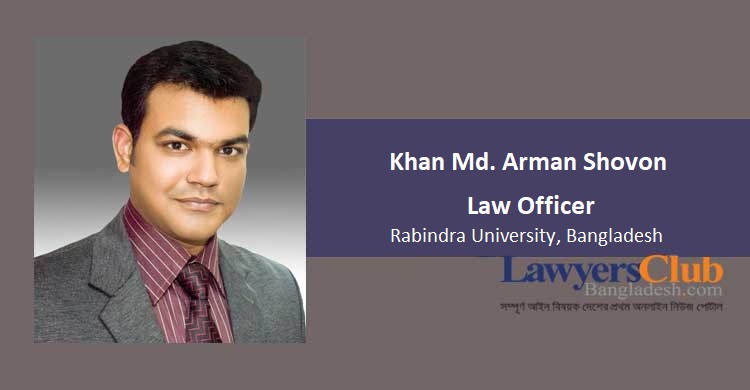Electronic waste Management in Bangladesh: Challenges of Environmental Law

Khan Md. Arman Shovon :
“I would feel more optimistic about a bright future for man if he spent less time proving that he can outwit Nature and more time tasting her sweetness and respecting her seniority.”
-Elwyn Brooks White
The innovative and characteristic of human beings has to lead to a life full of luxuries bestowed by nature. This habit of a normal human being has brought to the route of evolution but it has crossed the limits and has gone beyond the exaggeration where upcoming modern devices set not only a fashion statement but it has created havoc and a great threat to the green and clean environment. Electronic waste (E-Waste) is a man-made disaster which has posed a boundless jeopardize situation to the present generation to cope with its after-effects.
E-waste is any electrical or electronic equipment that’s been scrapped. This includes working and broken items that are thrown in the garbage or any second-hand reseller shop. Generally, if that component goes unsold in the store, it will be thrown away. E-waste is exceptionally alarming due to toxic chemicals that naturally leach from the metals inside when buried.
Figure 1: E-Waste (Ref: https://dailyasianage.com/news/247296/e-waste-emerging-threat-for-environment)
At present, Bangladesh has no particular environmental policy or act or guidelines to directly manage the e-waste problem. Nevertheless, a draft regulation on ‘E-waste management rules’ was refined and amended in 2011 and 2017 respectively under the Environment Conservation Act, 1995 but no development in rules acceptance and implementation has been visible till today.
Currently, there are some Legislation regarding E-Waste Management in our country. These are:
- National Environment Policy-1992.
- Bangladesh Environment Conservation Act, 1995.
- The Environmental Court Act, 2000.
- The Environmental Conservation Rules, 1997.
- Medical Waste Management Rules, 2008.
- E-Waste Policy 2017 (Draft).
To make a proper sound law to manage E-Waste, it is important to have environmentally sound technologies to manage electrical and electronic waste. Dismantling process of electrical and electronic waste should be followed an environmentally safe manner. Bangladesh’s Department of Environment (DoE) should securitize the enlisted e-waste recyclers and give license approval. BTRC approval/permission requires for e-Waste Equipment as well. Furthermore, recycling to be done in presence of representatives of all concerned authorities and stakeholders.
However, by implementing a particular regulation is not enough to manage E-Waste properly. It has many challenges also such as Awareness Build-up, Collection of e-Waste, Separation of different materials, Recycling, Management, Legal Enforcement, Health Hazards, Child Labour, Risk management/safetiness and Pollution. All these management should follow to make proper regulations. Human resources development with effective management can make this procedure easier. Health safety is one of the biggest issue to take sufficient measurement by doing E-Waste collection and management.
Guidelines for e-waste disposal sites needs to be specific such as disposal should be done in specialized cells or sections in a licensed landfill site and shall be licensed by DoE and Local Authorities. Operators must have technical knowledge and understanding of the Hazardous threat of e-waste. Disposers shall keep a record of the amounts and categories of waste which DoE may access upon request or during inspection of e-waste handling facilities.
Finally, it can be said that paying particular consideration to the role played by the informal sector of e-waste management and determining manufacturers responsibilities for such management with the integration of right environmental policy and capacity-based regulatory enforcement can pave the roadway to develop a formalized end-of life products waste management system. This is a dying need for Bangladesh if we are to relish the technology-mediated evolution with its full potential.
Writer : Law Officer, Rabindra University, Bangladesh.

